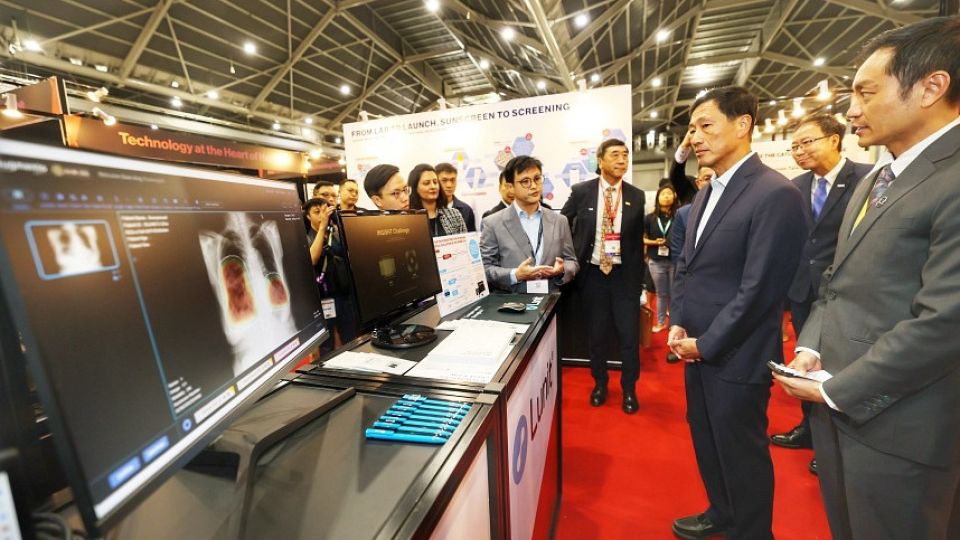October 11, 2024
SINGAPORE – Singapore’s public healthcare institutions will receive $200 million of funding support from the Government to better use artificial intelligence (AI) tools and genomics data to ramp up preventive care for patients.
The Ministry of Health (MOH) will invest the sum over five years. The amount, which will be injected into the MOH Health Innovation Fund, is separate from the Government’s investments in research and innovation through the Research, Innovation and Enterprise initiative, said Health Minister Ong Ye Kung, announcing the move.
“MOH will identify proven and impactful technology, or use cases, and scale them up into system-wide national projects,” he said, adding that making an impact with technology requires going beyond innovations by individual institutions, and some “centralised push” may be necessary.
Speaking at the opening ceremony of the 22nd Singapore Health & Biomedical Congress at the Singapore Expo on Oct 10, Mr Ong said the convergence of genomics, AI and a focus on preventive care would have a profound impact on healthcare. And healthcare innovation can reach its fullest potential only when people are protected against major risks, he added.
Three healthcare tech initiatives are in the works over the next year or two.
By mid-2025, MOH will launch a national genetic testing programme for familial hypercholesterolemia (FH), a hereditary condition which affects the body’s ability to process cholesterol and increases the risk of heart disease.
By the end of that year, automated record updating will also be implemented throughout the public healthcare system.
And, if the use of AI in the reading of breast cancer screenings is proven effective, it will be progressively rolled out from end-2025.
Noting that AI can help healthcare providers improve patient outcomes and deliver healthcare more efficiently, MOH said it plans to scale up the use of generative AI tools (gen AI) to automate tasks such as documentation and summarising medical records.
“We will roll out automated record updating throughout our public healthcare system before the end of 2025, so that healthcare professionals can spend more time caring for patients, and be less occupied with routine tasks,” the ministry said in a statement.
It also plans to expand the use of AI for imaging across the healthcare system, enabling earlier detection and follow-up on clinically significant signs.
The ministry will work with the Health Promotion Board and the healthcare clusters to study how AI can make the workflow for reading breast cancer screening images more efficient, and give patients their screening results earlier.
“If proven effective, from end-2025, we will start progressive roll-out of screening using AI for mammography across the system, with the proper workflows and care pathways in place,” Mr Ong said during the congress, organised by the National Healthcare Group.
Public hospitals can access imaging AI models from different vendors via the AimSG platform, which can also monitor the AI models to ensure their accuracy and the safety of patients.
During his speech, Mr Ong noted that AI can also be used to deliver predictive preventive care, with disease prediction models including parameters such as health status, lifestyles and socio-economic status.
The addition of genetic information can make such models even more powerful, he said.
In line with this, by mid-2025, MOH will launch a national genetic testing programme for FH.
Under the programme, Healthier SG general practitioner clinics and polyclinics will identify those with abnormally high cholesterol levels and refer them for FH genetic testing at a new Genomic Assessment Centre.
Should a patient test positive for the condition, their immediate family members will be encouraged to be tested as well. They will be eligible for means-tested subsidies of up to 70 per cent under the Specialist Outpatient Clinic subsidy framework, while the remaining co-payment can be further reduced by MediSave.
Those diagnosed with FH will receive support from Healthier SG clinics to adopt healthier lifestyles and start on subsidised cholesterol-lowering therapies.
“This proactive approach aims to significantly reduce the risk of premature heart disease and avoid future cardiovascular complications,” MOH said.
A genetic testing programme will help raise awareness of FH and allow for more people to be diagnosed earlier, said Associate Professor Tavintharan Subramaniam, an endocrinologist who leads a national screening and management initiative for the condition based at Khoo Teck Puat Hospital.
Should the programme prove successful, MOH will work on other major severe diseases, such as breast and colon cancers, diabetes, kidney failure, stroke and heart attacks, Mr Ong said, noting that this will require “sophisticated and multi-variate” AI models to be trained.
Well-established regulations in healthcare serve as “clinical gatekeeping” and ensure that the judgment of healthcare professionals remains in place even as the sector becomes enhanced by AI, he said.
“That said, we cannot swing to the other extreme, hemming ourselves in with regulations and rules, and failing to harness the opportunities of AI. We must be proactive in identifying use cases for AI in healthcare and adapt our rules and regulations to facilitate them,” he added.
Mr Ong said that in the coming years, MOH will enhance its information technology systems to drive innovation, while ensuring cyber security and data privacy, beginning with a consolidated electronic medical record system throughout the public healthcare system.
Gen AI tools will be integrated into the system to become part of its clinical and operational workflows, he added.
Meanwhile a new platform, called Health Empowerment through Advance Learning and Intelligent eXchange, will act as the AI “technology factory” for the healthcare system.
Developed by MOH and Synapxe, the cloud-based data infrastructure will enable the secure sharing of up-to-date and anonymised clinical and genomic data, among others, which will be used to train various AI and machine learning tools.


